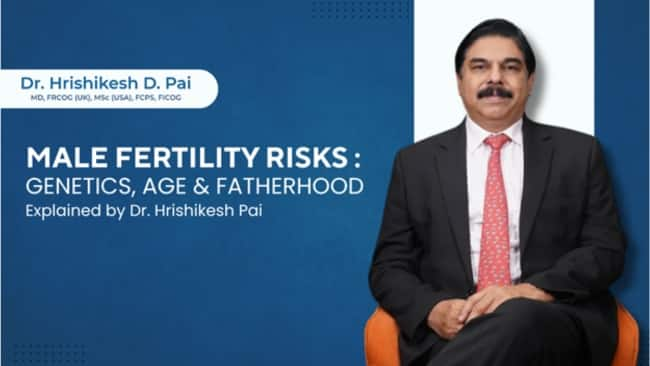Mumbai (Maharashtra) [India], May 27: For decades, public conversations around fertility have largely focused on women — their age, reproductive health, and biological clock. But today, a growing body of scientific research is prompting a critical shift: men’s age and genetic health also play a decisive role in reproductive outcomes. At the forefront of this evolving dialogue is Dr. Hrishikesh Pai, globally renowned fertility specialist and Medical Director of Bloom IVF, who is championing greater awareness about male fertility, genetic risks, and the implications of advancing paternal age.
As a leading IVF doctor in India, Dr. Pai emphasizes that fertility is a shared responsibility. “We now know that men over the age of 45 are not only more likely to struggle with fertility but may also pass on subtle genetic mutations that can impact the long-term health of their offspring,” he explains. “These risks are often invisible in standard semen tests, which makes understanding male reproductive aging all the more essential.”
Globally, research shows that male fertility begins to decline gradually after age 40, with more significant drops in sperm motility, morphology, and concentration seen in men aged 50 and above. A study published in the journal Nature found that children of fathers aged 50 had four times as many de novo mutations — spontaneous genetic changes not present in either parent’s DNA — compared to children of fathers in their 20s. These mutations have been linked to increased risks of autism, schizophrenia, bipolar disorder, and certain pediatric cancers.
Moreover, a large study from Stanford University (2020) concluded that men over 45 were associated with longer time-to-pregnancy, higher miscarriage rates, and increased chances of gestational complications, even when the female partner was young and healthy. “There’s a common misconception that only women have a biological clock — but science shows that men do too, and it’s ticking more loudly than ever,” says Dr. Pai.
At Bloom IVF — one of India’s most advanced fertility networks with 11 state-of-the-art centers — Dr. Pai and his team integrate advanced diagnostic protocols for male fertility. These include sperm DNA fragmentation testing, oxidative stress assessments, genetic karyotyping, and Y-chromosome microdeletion analysis, particularly for men over 40 or those with unexplained infertility. “Semen analysis alone doesn’t tell the full story,” Dr. Pai notes. “We need to look at the molecular level — because that’s where many male fertility issues hide.”
One of the breakthrough technologies employed at Bloom IVF is IMSI (Intracytoplasmic Morphologically Selected Sperm Injection), a technique introduced to India by Dr. Pai himself. By magnifying sperm up to 6000 times, IMSI allows embryologists to choose sperm with the most intact morphology and lowest DNA fragmentation — leading to significantly improved fertilization and embryo development rates. “For older men or those with repeated IVF failures, IMSI can be a game-changer,” Dr. Pai says.
In one recent case, a 48-year-old man and his 36-year-old wife had undergone three failed IVF cycles at other clinics. Upon evaluation at Bloom IVF, sperm DNA fragmentation was found to be over 30%, indicating poor genetic integrity. After three months of antioxidant therapy and a subsequent IMSI-guided ICSI cycle, the couple conceived successfully — and delivered a healthy baby boy. “When we dig deeper and personalize care, outcomes improve dramatically,” says Dr. Pai.
India is witnessing a fertility transformation, with infertility affecting 10–15% of couples. Notably, male factor infertility contributes to nearly 50% of all cases, according to a 2021 report by the Indian Society for Assisted Reproduction (ISAR). Yet, due to social stigma and lack of awareness, men are often not evaluated thoroughly. “It’s time to change the narrative,” says Dr. Pai. “Men need to be included — and educated — at every stage of the fertility journey.”
Dr. Pai also advocates for preventive fertility strategies for men, especially those delaying fatherhood due to career or lifestyle choices. This includes lifestyle adjustments, antioxidant support, and elective sperm cryopreservation in the 30s or early 40s. “Sperm freezing is not just for cancer patients anymore. It’s a proactive step for men who want to preserve their fertility potential while their sperm is genetically healthiest,” he says.
With over 40 years in fertility medicine, multiple national awards, and thousands of successful IVF cases to his credit, Dr. Hrishikesh Pai has long been a pioneer of patient-centered, innovation-driven reproductive care. He is also a recipient of the ISAR Lifetime Achievement Award, Times Healthcare Achievers Award for “Legend – IVF & Fertility,” and a Fellow of the Royal College of Obstetricians and Gynaecologists (FRCOG), UK.
“Parenthood is a beautiful journey, and science is giving us more control than ever before. But that control starts with knowledge — especially for men,” Dr. Pai concludes. “Understanding the genetic risks of advanced paternal age empowers couples to make informed, timely decisions — and helps us bring more healthy babies into the world.”
To learn more about male fertility and advanced reproductive testing, or to schedule a consultation with Dr. Hrishikesh Pai, visit:
https://www.clinicspots.com/ivf-doctor/mumbai/dr-hrishikesh-pai
https://www.bloomivf.com/doctor/dr-hrishikesh-pai
Dr. Hrishikesh Pai
Bloom IVF, Lilavati Hospital and Research Centre
Bandra Reclamation Rd, General Arunkumar Vaidya Nagar, Bandra West, Mumbai, Maharashtra 400050
+91 98200 57722
About Dr. Hrishikesh Pai:
Dr. Hrishikesh Pai is one of India’s most distinguished IVF specialists, with over 40 years of expertise in infertility, gynecology, and assisted reproduction. As Medical Director of Bloom IVF, he leads one of India’s top fertility networks, renowned for its cutting-edge technology and compassionate care. Dr. Pai is globally recognized for introducing advanced technologies like IMSI and laser-assisted hatching to India and is committed to delivering personalized, ethical, and science-backed fertility solutions.
[Disclaimer: This is a featured article. ABP Network Pvt. Ltd. and/or ABP Live do not endorse/subscribe to its contents and/or views expressed herein. All information is provided on an as-is basis. The information does not constitute advice or an offer to buy. Consult an expert advisor/health professional before any such purchase. Reader discretion is advised.]
